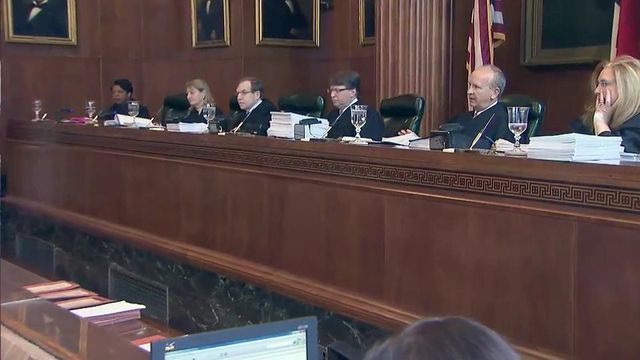Supreme Court weighs NC school voucher program
School vouchers either wrongly divert North Carolina tax money to private and religious schools or offer low-income families the option of sending their children to the same schools as wealthier families.
Posted — UpdatedBoth arguments were presented Tuesday to the North Carolina Supreme Court, which must determine whether the Opportunity Scholarships program created by state lawmakers two years ago is legal.
Under the program, families can apply for annual grants of $4,200 per child per year to help defray the cost of tuition to a non-public school. Lawmakers set aside $10.8 million for thousands of such vouchers.
The North Carolina Association of Educators and the North Carolina School Boards Association filed separate lawsuits against the law – dozens of local school boards also challenged its legality – and a Superior Court judge ruled last August ruled that the program was unconstitutional because tax money was being spent on schools that could discriminate in their admissions and which aren't required to meet the same academic standards or accountability of public schools.
"North Carolina has many fine private schools, but the problem with this legislation is these funds flow to all private schools, regardless of quality," said Burton Craige, an attorney for the NCAE. "The legislature can't hand over millions of dollars based on the blithe assumption that anything that calls itself a school is providing a real education."
Richard Komer, an attorney with the Arlington, Va.-based Institute for Justice, which is representing some families with vouchers, argued that North Carolina's public schools are the ones that lack accountability and standards.
"The public schools operated by the school districts of North Carolina are not performing well with regard to low-income, economically disadvantaged students this program is targeted to," Komer said, saying that five of six such students are failing one or both of the end-of-grade reading and math tests given by North Carolina public schools.
Komer and Noah Huffstetler, who represented state legislative leaders, also said that the private schools are accountable to the parents of their students and that the parents are the ones receiving the tax money, not the private schools.
"Parents know what's best for their children and will seek an adequate, decent education for their children," Komer said. "There is no assurance in the world that they will achieve that."
Bob Orr, an attorney for the School Boards Association, said the law that created the Opportunity Scholarships doesn't require that students who get the vouchers come from failing schools or be struggling in public schools and therefore need the option of a private school education.
Orr and Craige also said that giving parents money to send their children to private schools doesn't absolve the state of its obligation to ensure the students obtain a sound education.
"Where's the public benefit in a standard-less education in which the state has no ability to impose at least certain parameters on curriculums and standardization of teachers?" Orr asked. "It primarily benefits the parents who are selected (for vouchers)."
Huffstetler said educating the students whose families used the vouchers is a public purpose that would allow the expenditure of taxpayer funds. But Edwin Speas, who also represents the school boards, said people need to look past the "education" label to determine whether the private schools should receive public money.
He and Craige noted that many religious schools require students to adhere to the tenets of the church with which the school is affiliated. Also, Craige said, only about one-third of private schools in the state are accredited, meaning that the majority could have poorly trained teachers, disregard science or history instruction and bar admission to special needs students.
Steve Martin, who also represented legislative leaders in the case, said, however, that receiving public money through vouchers doesn't mean that the private schools must adhere to the nondiscrimination standards of public schools.
Assistant Attorney General Lauren Clemmons argued that North Carolina's constitution doesn't preclude the use of school vouchers in its language requiring the state to establish a public school system. But Craige and Orr disputed that, saying the constitution notes tax money is to be used "exclusively" for public schools.
"If this General Assembly wants to give taxpayer funds to private schools," Craige said, "it can do so only through an amendment to the constitution."
A Supreme Court decision isn't expected for two to three months.
The state Court of Appeals last fall allowed state money for the vouchers to be released to the families of nearly 1,900 students who had accepted Opportunity Scholarships before the program was put on hold. Sunday is the deadline for families to apply for vouchers for the 2015-16 school year, and a lottery will be held in March to select recipients.
Related Topics
• Credits
Copyright 2024 by Capitol Broadcasting Company. All rights reserved. This material may not be published, broadcast, rewritten or redistributed.






